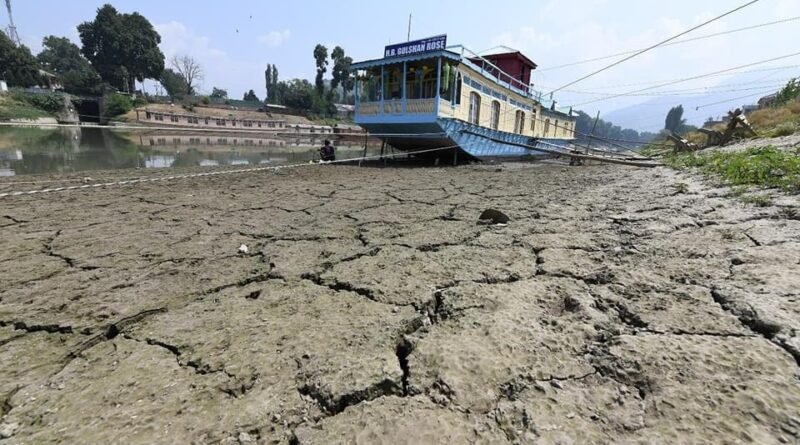Heat Wave Reduces Water Level of Jhelum River in Srinagar
Tariq Bhat
Recent heatwave in Kashmir has led to a significant eduction in the water level of the Jhelum River in Srinagar.
The region has been experiencing record-breaking temperatures, with Srinagar hitting its hottest day since the establishment of its weather observatory in 1891, and other areas like Qazigund also recording unprecedented highs .
The prolonged dry spell and high temperatures have caused a 30% decrease in the Jhelum River’s water level, which is causing concern among local residents and farmers. The lack of rainfall in August and September has exacerbated the situation, affecting water availability for agriculture and daily use. The government has acknowledged the issue but assured that the impact is temporary and conditions will improve with future precipitation .
The heatwave has multiple adverse effects, including on human health and agriculture. Farmers are particularly worried about the impact on their crops, such as apples, which have not ripened as expected due to the high temperatures .
The authorities have advised residents to use water judiciously until the situation improves
Amidst the persistent dry spell, most parts of Kashmir recently experienced a heatwave, with Srinagar recording a maximum temperature of 35.6 degrees Celsius.
This intense heat has subsequently led to a 30% decline in the water level of the Jhelum River.
The situation is concerning for local residents and farmers, as water scarcity affects both agriculture and daily use.
While the government acknowledges the issue, they assure that the impact is temporary and conditions will improve with future precipitation.
Farmers, in particular, are worried about their crops, including apples, which have not ripened as expected due to the high temperatures. Authorities recommend judicious water usage until the situation improves. Let’s hope for relief soon!
A severe heatwave in Kashmir has drastically lowered the water level of the Jhelum River in Srinagar. The region has experienced unprecedented high temperatures, with Srinagar recording its hottest day since the establishment of its weather observatory in 1891. The prolonged dry spell and lack of rainfall in recent months have contributed to a significant decrease in water levels, causing concern among local farmers and residents.
Authorities have assured that the situation is temporary and expect conditions to improve with future precipitation




